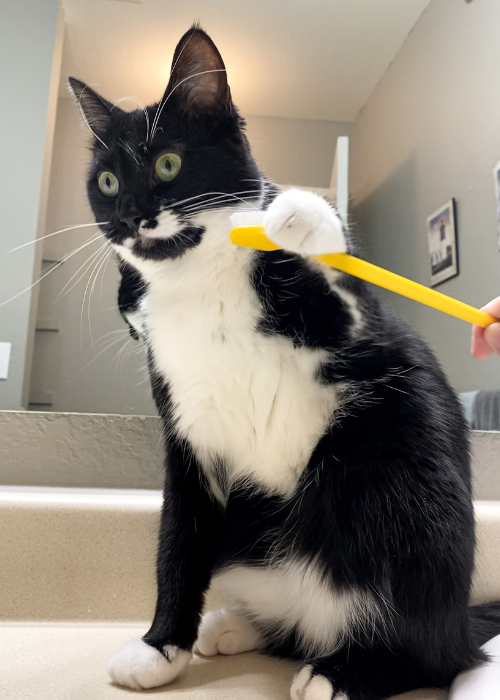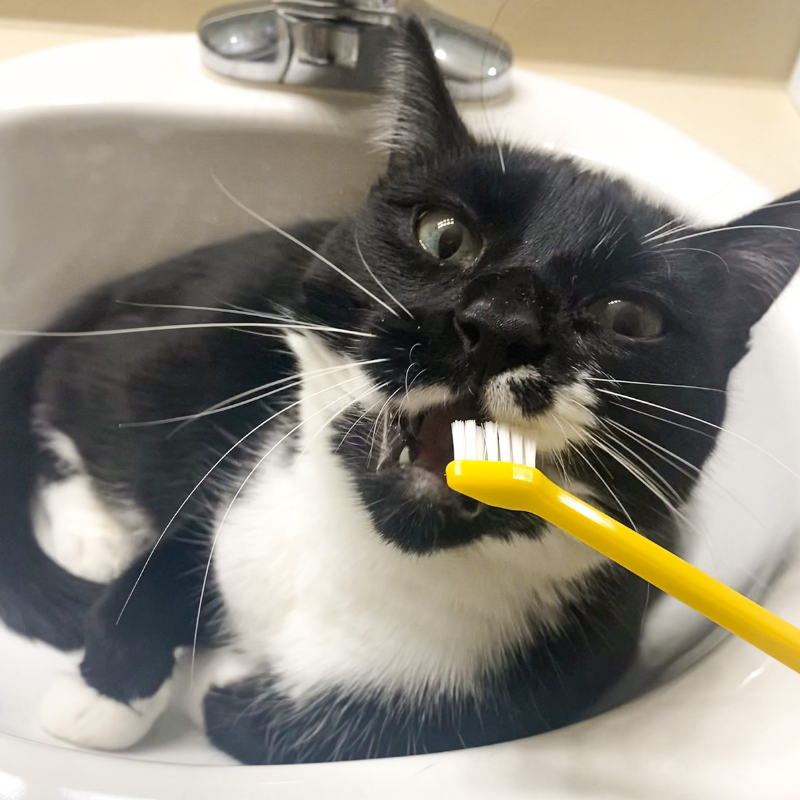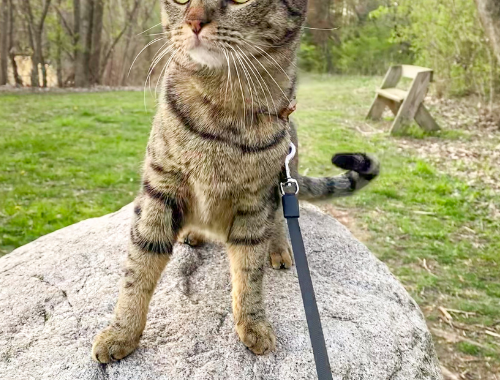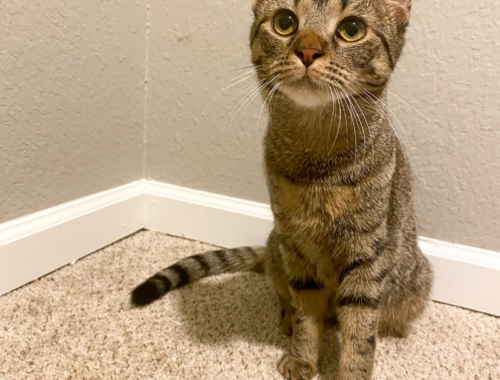
How To Have Good Dental Care For Your Cat
February is National Pet Dental Health Month
It is time to talk dental care for your cat! As people, it is recommended that we see a dentist every six months. We are also told to brush our teeth twice daily and floss. So, what about your cat? Do you have to do anything for their dental health? Well, the month of February is dedicated to the awareness and importance of dental care for pets! There are lots of free resources provided by veterinarians and veterinary associations during this month. Dental care for your cat is very important, and we will touch on why, signs that your cat may need dental care, and ways to help prevent dental disease.
Importance Of Dental Care For Your Cat:
Did you know that by the age of 3 years old, up to 70-80% of cats have some form of periodontal disease? How does this happen? First, periodontal disease is a progressive disease that causes inflammation of the gums. This begins when the bacteria in your cat’s mouth forms plaque. The minerals in cat saliva can harden the plaque, which now forms tartar. Tartar spreads down below the gum line and disrupts the supporting structures of the tooth. This can lead to things such as gum recession, bone loss, loose teeth, tooth infections, or even a fractured jaws.
Proper health care is key for prevention of many health issues, and dental diseases are no different! Many dental related issues can be prevented by implementing good dental care for your cat early in their life. It is always best to work on preventing the problem than having to treat the problem.
What Other Health Issues Come From Bad Dental Hygiene?:
The bacteria in your cat’s mouth can actually enter their bloodstream and lead to other illnesses. This infection can spread to your cat’s kidneys, liver, and even heart. These secondary bacterial infections can cause serious damage to your cat’s internal organs and cause them to become very ill and need extensive veterinary care.
Signs Your Cat May Have Dental Issues:
- Bad Breath
- Red and inflamed gums
- Loose or broken teeth
- Discolored teeth
- Drooling excessively
- Bleeding from mouth
- Sensitive or painful when you touch their mouth or teeth
- Dropping their food or abnormal chewing
- Loss of appetite
- Weight loss
What Happens If Your Cat Needs A Dental Cleaning?:
If your cat has a more advanced stage of periodontal disease, a dental cleaning by your veterinarian will most likely be recommended. This procedure is similar to routine dental checks with our own dentists. The veterinarian will do an oral exam, scale and polish the teeth, and possibly take dental x-rays. There is one difference though, and that is that our cats require anesthesia to have this done.
For people, we know what is being done and can communicate with our dentist any pain or issues we may have. Your pet cannot do this and does not understand the process. Anesthesia will help make the situation less stressful for them and allow the veterinarian to clean the teeth more effectively and get below the gum line. Also, if radiographs are needed, your cat will have to stay very still, which can be difficult for them, especially if stressed.
Of course, there are risks with anesthesia, just as with people. Your veterinarian will address these with you beforehand, so be sure to ask them any questions. A routine dental cleaning is fairly quick and your pet will go home the same day. If there are any health related concerns to your cat from the procedure, your vet may recommend you to a broad certified veterinary dentist or to a place where there is a broad certified anesthesiologist.
Prevention Is Key:
Routine health checks at your vet
- Most dental diseases occur below the gum line, where we cannot see them. This is why your cat should be having a check up with a veterinarian at least once a year (just like us people). During this yearly exam, the vet will check your cat’s teeth. This is also a great time to ask them for any tips they have, as they are the professionals. We recommend discussing any concerns with your vet before making any changes to your pet’s health care.
Brush your cat’s teeth
- In order to start brushing your cat’s teeth, you need 3 things:
- A pet toothbrush – the angled ones work best. We use this one.
- Pet toothpaste – Do not use human toothpastes can cause upset stomachs in cats. We use this one for cats.
- Yummy treats
- Next, you will want to set a routine, as by nature, cats love routines. This will help them understand that it is time to have their teeth brush, which can help relieve some stress associated with the process.
- Brushing their teeth daily is ideal, but understandably not always feasible. Even brushing once a week can help improve your cat’s dental health. Doing something is better than nothing at all!
- Positive reinforcement is the most effective way to train cats with any situation. Training them to enjoy getting their teeth can be done with clicker training. Check out our article on clicker training here to help get started if you are not familiar with it.
- Always make sure your cat is comfortable. If they are stressed out, stop the session and try again a different day or use a different approach. You can even try a different flavor or toothpaste to see if that will help entice them.
- In order to start brushing your cat’s teeth, you need 3 things:
Now comes the tricky part – teaching them to enjoy the process of having their teeth brushed.
Here are some of our tips:
- Start off by getting your cat comfortable with you touching their face, mouth, and flipping their lips up. This may take some time but is an essential step in the process.
- Next, let them smell the toothbrush and toothpaste and get used to it on their own terms.
- Pet toothpaste comes in many flavors, so test out a few to see what your cat likes best.
- Once they are comfortable with the taste of the toothpaste, put it on the toothbrush and let them eat it off there, while trying to make little movements on their teeth if possible.
- Gradually work your way up in time. Starting with just 5-10 second sessions at first is great. Typically 30-45 seconds is good for daily brushing.
- Focus on the outside of the teeth, as that is where most of their plaque builds up. Brushing the inside of your cat’s teeth may be difficult and stress them out.

-
Toys
- Chewing on toys can help dislodge and prevent plaque. Toys with ridges, bristles, and different textures work great. There are options that you can place a treat inside that your pet can then chew on the toy to get to the treat. It’s a win/win for everyone!
-
Treats
- There are quite a few dental treats out there. Some examples include Greenies, Whiskas, and Dentalife. These treats are typically harder and larger, making your cat have to chew them. This helps dislodge and scrape off plaque buildup on the teeth.
-
Water and Food Additives
- Water additives are a great alternative if your cat is a water drinker. Cats are typically known for not being the best at drinking water, so a water additive will not be beneficial if they are not actually drinking. If you use a water additive, be sure that you know your cat is drinking from that bowl with it.
- Check the label on the additive and see if it can be added to food. Adding it to food may be much easier, as the smell of the food and them being hungry may be enough to distract from the addition. However, some water additives are specific to water and cannot be mixed with food or they lose their effectiveness. There are also some additives specifically made to be added to food, which can be a great alternative.
Conclusion:
Dental care for your cat is just as important for their health as your own dental care is for you. Some people may think it may be funny that someone takes the time to brush their pet’s teeth, but it is something we should all try to do. This can not only save you money with your vet having to do dental cleanings under anesthesia, but can always help prevent diseases in other internal organs. If you do not have a dental routine set up for your cat, we definitely recommend you talk to your vet and create a plan that works for both you and your cat. Your vet will be very impressed with your enthusiasm for proper dental care, especially during National Pet Dental Health Month!You May Also Like

Importance Of A Back-Up Plan When Walking Your Cat
June 11, 2021
How To Start Clicker Training With Your Cat
January 22, 2021


